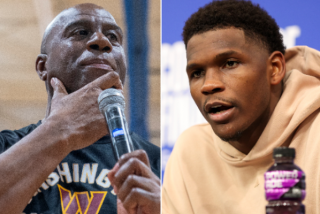Bird gets the love, Isiah the kiss-off
Magic Johnson’s relationship with Larry Bird, like so much else about Johnson, was one of the best things the NBA ever saw.
They started out hating each other as rivals in the 1979 Michigan State-Indiana State NCAA final, the highest-rated basketball game of all time; re-floated the Lakers-Celtics rivalry, then, in an unexpected inspiring turn, became longtime friends, showing themselves and everyone else how much of themselves an urban African American and a self-described “hick from French Lick” could see in each other.
Each inspired the other’s best and awakened his darkest fear. After one Celtics win in the Forum, Bird, sitting on the team bus, saw a distraught Johnson walk by.
Said Bird later, laughing: “I thought, ‘Suffer, @#$%$#@!’ ”
Johnson’s relationship with Isiah Thomas was Magic & Larry backward, a close-as-brothers bond gone wrong, which Johnson acknowledged in a new book he and Bird co-wrote with Jackie MacMullan, “When the Game was Ours.”
Johnson acknowledges knowing that Thomas participated in the 1985 All-Star freeze-out of Michael Jordan, and didn’t object when Thomas was left off the 1992 Olympic Dream Team: “Nobody on that team wanted to play with him,” writes Johnson, et al. “. . . Michael didn’t want to play with him. Scottie [Pippen] wanted no part of him. Bird wasn’t pushing for him. Karl Malone didn’t want him. Who was saying, ‘We need this guy?’ Nobody.”
Worst of all, Johnson writes, he was told Thomas spread rumors he was gay after Johnson’s 1991 announcement he was HIV-positive. Some men, like Johnson, are born to be icons. Some, like Thomas, who’s no more a saint or a sinner than Johnson or Jordan, are born to be lightning rods.
(The modern-day version is Kobe Bryant, until recently the NBA’s most shunned superstar ever. Some prodigies, like LeBron James, who, Commissioner David Stern just told “Sports Professor” Rick Horrow, “may be the best player who ever lived,” are beloved, with or without titles. Some, like Bryant, have four titles and are only beginning to get their due.)
Magic, whose personality was a greater gift even than his game, has led a charmed life. When he messed up, it slid into the mist of history.
Thomas was every bit as engaging. If it wasn’t a good idea to be between Thomas and something he wanted, he wasn’t just charitable but messianic. At 25, he promoted No Crime in Detroit Day, going into lawless neighborhoods to make personal pleas to gang leaders. As NBA Players Assn. president, Thomas was the last of the stars to run the union for the little guys in the tradition of Oscar Robertson.
Thomas made enemies by the hundred, calling out the biggest he could find, slicing the agents’ cut of contracts from 10% to 4%, infuriating them all. Super-agent David Falk then took over the union with his fancy client list and undid everything Thomas had done in a campaign for superstar rights that led to the 1999 lockout.
With the Lakers and Pistons going head to head in the 1988 and 1989 Finals, Johnson and Thomas became enemies on the court . . . and off, for Lakers coach Pat Riley, who raged privately when Johnson exchanged kisses on the cheek with Thomas before games.
Perhaps fearing Riley would go into a coma if he heard Johnson had gone to the hospital in the middle of the night when Thomas’ son was born during the 1988 Finals, Magic took a pass on that one, stinging Isiah. In Game 4 of that series, they shoved each other and had to be held apart.
Johnson’s friends thought Thomas was envious. Isiah lived for the day he could be Magic II, or Isiah I . . . just as Bird and Magic lived for the day they were up and the other wasn’t. If superstar friendships are often equal parts love and hate, Johnson started one way and went the other with both Thomas and Bird.
What remained of the friendship was shattered in 1991, when Johnson was told Thomas was spreading the rumor Johnson was gay.
Insiders have known the story for years. I heard it off the record from all the principals, except Magic. I never believed it as presented, and still don’t.
I can easily imagine Thomas asking about rumors Johnson was gay, then denying he had forever.
What I’ll never believe is that Thomas intended to harm Johnson.
The whole world cried the day Johnson made his HIV announcement. If Thomas has a Napoleon complex Bonaparte himself would have envied, I can’t imagine his then turning on his friend, whatever they’d gone through.
Whatever Johnson believes, the fact is Thomas, as union president, subsequently pushed for him to play in the 1992 All-Star game. (Stern made it happen only after suggesting Magic come off the bench to mollify leery sponsors and owners.) Thomas led players over to hug Johnson before the game, wiping away weeks of tension in one warm moment.
By then, Thomas had become isolated within the game for one overriding reason, his enmity with Jordan.
Leaving Thomas off the Dream Team had nothing to do with Pippen, Bird or Malone and everything to do with Jordan. He hated Thomas, whose Bad Boy Pistons had beaten him up and eliminated his team in 1988, 1989 and 1990.
With Jordan looking for a way not to go to the Olympics, his sensitivities were paramount. His joking “I don’t play on no teams with Isiah Thomas,” to someone on the selection committee, according to Sam Smith’s “The Jordan Rules”, meant Thomas, the 11-time All-Star with two titles, wasn’t going.
When the game was theirs, it really was a golden age. Unhappily, nothing lasts forever, or comes close.
--
More to Read
Go beyond the scoreboard
Get the latest on L.A.'s teams in the daily Sports Report newsletter.
You may occasionally receive promotional content from the Los Angeles Times.










